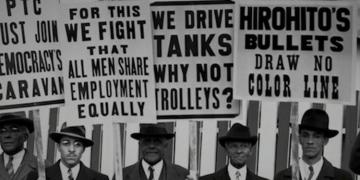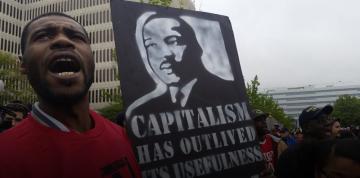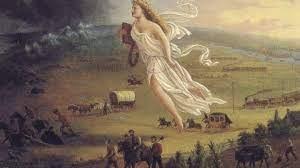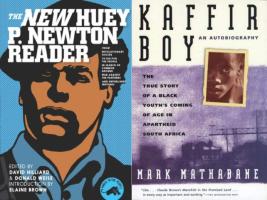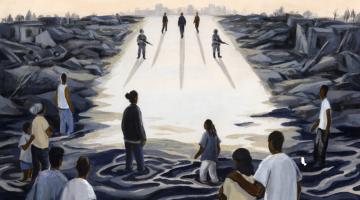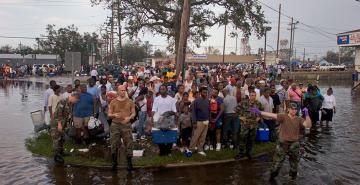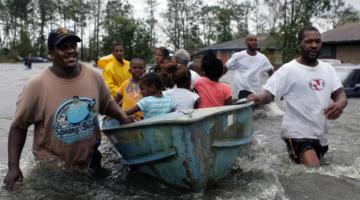The politics of fat shaming is tied to anti-Black racism.
In this series, we ask acclaimed authors to answer five questions about their book. This week’s featured author is Da’Shaun Harrison. Harrison is a Black trans writer, abolitionist, and community organizer in Atlanta, GA. Harrison currently serves as the Managing Editor of Wear Your Voice Magazine. Their book is Belly of the Beast: The Politics of Anti-Fatness as Anti-Blackness.
Roberto Sirvent: How can your book help BAR readers understand the current political and social climate?
Da’Shaun Harrison: I believe that Belly of the Beast: The Politics of Anti-Fatness as Anti-Blackness can help BAR readers understand the current sociopolitical climate through the way it interrogates the myriad ways anti-fatness collaborates with—or, as the name suggests, takes the name of—other forms of violence that plague Black communities. This book helps the reader form a deeper analysis around police and state violence, the war on drugs, gender(ed) violence, desirability, abolition and more as it relates to today’s climate. (Anti)fatness plays a significant role in how Black people are engaged, both socially and politically, and this book will help BAR readers become clear about exactly how that looks. Historically and presently, fat Black folks have been at the crux of violence waged by World against Black flesh. Belly of the Beast seeks to walk the reader through the interrelated nature of this anti-Black anti-fat violence; to name that fatness is not separate from Blackness, but rather that both are predicated on the animality assigned to /,these modes of being—rendering them one and the same. Which is to say that the Black fat, as I call it, is central to this World-making project that renders Black + fat subjects as both alive and lifeless; human and animal; fetishized and undesired; policed and unprotected; the metric by which health is measured and unable to ever achieve “healthy” as a status.
What do you hope activists and community organizers will take away from reading your book?
After reading Belly of the Beast: The Politics of Anti-Fatness as Anti-Blackness, I hope that fellow organizers and activists will understand how imperative it is to include fat politics in all of our spaces. As it stands, organizing around fat and/or disabled issues, specifically, is slim. Many, if not most, left spaces have not adopted and further developed a fat politic, and as such, fat people continue to suffer—even as many of us carry the load of organizing in general. Following this book, it is my hope that we are all much more clear about the impact of anti-fatness, especially as it relates to Black people. How anti-fatness warps the ways our bodies are engaged; how anti-fatness acts as a second name for anti-Blackness; how Desire, health, and other modes of being that we’ve accepted as “normal” are just other iterations of the very violences we’ve long organized against. And as such, it deserves our immediate attention, too. I also hope, however, that this book makes other organizers see that violence is not just structural; or rather that structural violence is produced first through metaphysical violence.
We know readers will learn a lot from your book, but what do you hope readers will un-learn? In other words, is there a particular ideology you’re hoping to dismantle?
Right now, we are in a pivotal and ever-growing moment where the general public is reckoning with the ways that fat (peoples) bodies are engaged. On a much more public platform, there is lots of talk about body size and the diversity therein. This reckoning, however, is seated at the surface of the myriad ways anti-fatness more deeply harms, particularly, the Black fat. The Black fat—an entity, of sorts—experiences a much more violent reality than being called names or not being able to find clothing to wear. And while those examples are manifestations of the violence of anti-Black anti-fatness, we are also at the crux of police violence; positioned at the heart of gender’s violence and gendered violence; navigating health and its care system as beings who have always been placed outside of such possibility; living with/in identities formed at the genesis of human’s creation.
In other words, the Black fat’s liberation is contingent on recognizing anti-fatness is/as anti-Blackness. It will be determined by our ability and desire to jettison any and all surface analyses of fatness that separates it from its Black origins, or attempts to write it off as a violence experienced only interpersonally and not metaphysically.
Belly of the Beast offers that, more than anything, there is no way to dismantle any of the World-making violence we experience if we are not writing, organizing, or thinking with the destruction of World in mind.
Who are the intellectual heroes that inspire your work?
I love this question! There are so many, and I am lucky to have gotten some of them to co-sign this book. Kiese Laymon, Sabrina Strings, Hunter Shackelford, and Sherronda Brown are all very special to me. But also Jordan Mulkey, Tea Troutman, Rebecca Wilcox, Caleb Luna, and Sydneysky Griffin. Zakiyyah Iman Jackson, Joy James, Christina Sharpe, Hortense Spillers, Saidiya Hartman, Rinaldo Walcott, Sylvia Wynter, and George Jackson. Frantz Fanon, Michel Foucault, and Judith Butler. There are so many intellectual heroes I could list here. I am inspired by so many. Some are friends, some are just people I read and admire from afar, but they have all had such a great impact on me and my work.
In what way does your book help us imagine new worlds?
I’m not entirely sure that my book helps us imagine new worlds, nor am I sure that that’s what I wanted it to do. What I am certain of is this: Belly of the Beast: The Politics of Anti-Fatness as Anti-Blackness is a book intended to inform the reader with great certainty that this World must be destroyed. In the book, I talk of the “Beyond”—something I imagine comes after World. And I inform the reader that for us to ever get to whatever the Beyond is, we must first destroy World. The truth is that I don’t know whether or not a new world is possible; I hope not. I hope we find better language to describe a place that is hopefully free from the violences that have plagued this World since the beginning of Time. This isn’t an easy pill to swallow, nor is it always something that any of us want to reckon with. But all I can be certain of is the fact that this World is killing us, and there is no salvaging it. What comes next, the Beyond, is totally dependent on us and what we think up together.
Roberto Sirvent is editor of the Black Agenda Report Book Forum.




